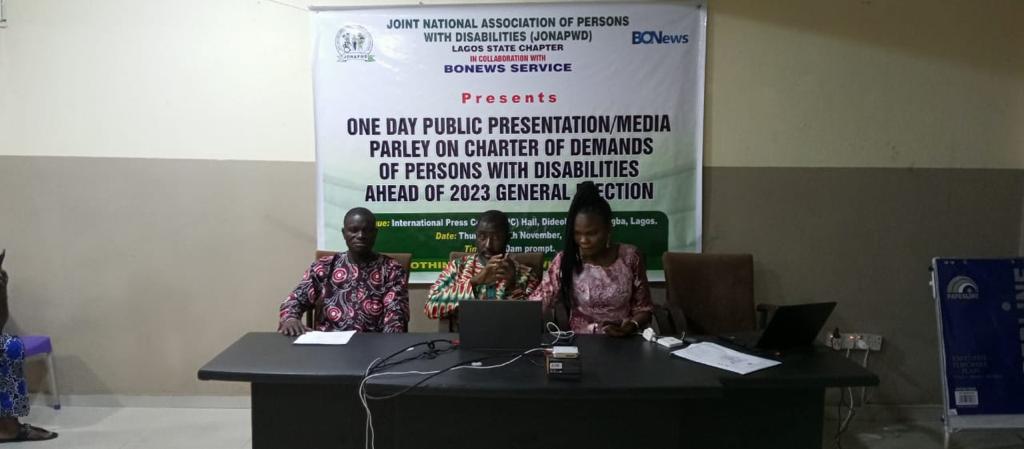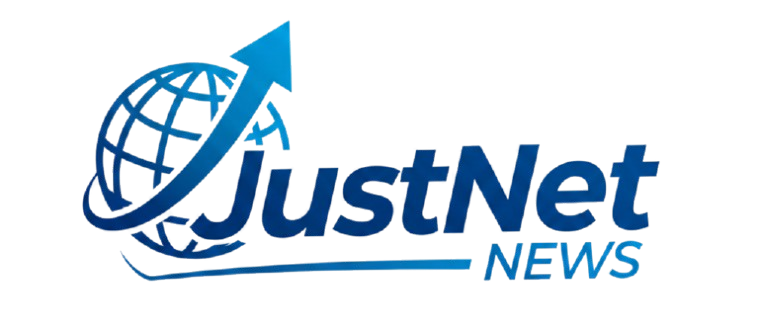
The Lagos State Chapter of the Joint National Association of Persons with Disabilities (JONAPWD), an umbrella body of all disability clusters and groups, in collaboration with BONews Service, an online development news platform providing media coverage and reportage to disability issues in Nigeria, recently launched a charter of demands of persons with disabilities in Lagos State.
The Charter of Demands is a collection of the demands of PWDs in Lagos State through a rapid response survey.
Spokesman of JONAPWD, Doctor Adebukola Adebayo, at the public presentation of the Charter of Demands in Lagos, said the demands represent the requests of PWDs in Lagos State and that it would be used by different disability groups, organisations and individuals to demand for the mainstreaming of disability-inclusion across different sectors from political candidates (at local government, State House of Assembly, National Assembly and Gubernatorial levels in the State) participating in the forthcoming 2023 general elections, and upon emergence into office.
Worthy of note is that the World Bank and World Health Organisation’s (WHO) data on disability in 2011 asserted that 15 per cent of every country’s population has a disability and that disability prevalence in the low middle income countries (LMIC) is about 19 per cent and 11.8 per cent in developed countries.
Prevalence is about 12 per cent for men while it is about 19 per cent for women. Recent reports suggest that this is more likely to be higher in settings where there are conflicts, man-made or natural disasters as these could lead to an increase in the population of PWDs.
Using the disability prevalence rate of 15 per cent, Adebayo said it is estimated that there are about 30 million PWDs in Nigeria, and about 2.5 million PWDs in Lagos State.
He highlighted that there are different categories and clusters of disabilities, some of which include; Albinism, Deaf, Dwarfism, intellectual, Physical Disability, Psychosocial, Spinal cord Injured, Spina Bifida and Hydrocephalus, Visual impairment and others.
“As PWDs, this category of people in the society are faced with numerous barriers in different sectors ranging from access to education, health services, work and employment opportunities, transportation, economy, communal life, social protection and participation in politics and leadership positions.
“To address these gaps, there are local, national, and international policies, laws and frameworks that have been designed to address the challenges that PWDs encounter in different sectors of the society,” he pointed out.
According to him, before the Federal Government of Nigeria domesticated the United Nation Convention on the Rights of Persons with Disabilities (UNCRPD – 2010) through the passage of the Discrimination Against Persons with Disabilities (Prohibition) Act in 2019, the Lagos State Government had in 2011 adopted the Lagos State Special People’s Law (SPL) and set up the Lagos State Office for Disability Affairs (LASODA), saddled with the responsibility of implementing the SPL.
However, Adebayo regretted that despite the existence of these legal frameworks, members of the disability community have not ceased to experience discrimination and non-inclusion in the plans and programmes of the government.
“Past administrations in Lagos State have shown some form of commitments to ameliorate the plights of PWDs in the state, though some are from a tokenism or charity-based approach, while some interventions have not adequately addressed the core needs of members of this community.
“It is in this regard that the Lagos State Chapter of the Joint National Association of Persons with Disabilities (JONAPWD), an umbrella body of all disability clusters and groups, in collaboration with BONews Service, an online development news platform providing media coverage and reportage to disability issues in Nigeria, conducted a rapid response survey among PWDs in Lagos, to assess the current administration of Lagos State regarding disability inclusion, and to make specific demands that would address the needs of PWDs in the state,” he stated.
The survey revealed that largely, PWDs in Lagos think that the current administration in the state has not considered the issues of disability-inclusion to be germane, nor has there been adequate mainstreaming of disability issues into the plans, programmes and policies of the Lagos State Government.
PWDs in Lagos state are therefore demanding that the current and in-coming government in Lagos state should demonstrate a strong commitment to full implementation Of the SPL.
The requests have been broadly categorised into Employment and Economy, Education, Health, and Road and Transportation.
The JONAPWD, Lagos, requested that education be made more inclusive and accessible to PWDs, hence, the state government should review and strengthen the Inclusive Education Policy with a 5-year implementation plan that will receive an annual cash-backed budget.
It should set up a distinct Directorate for Special and Inclusive Education is established under the Ministry of Education to provide the necessary professional and institutional support to the delivery of qualitative, functional and inclusive education to children and learners with disabilities at primary, secondary and tertiary levels respectively.
Under health it requested that the government needs to put in place a disability-Inclusive Health Framework in line with the SPL.
It also asked the Lagos State Government to demonstrate real and sustained commitment to a more holistic and systemic approach to the socio-economic empowerment of PWDs.
Noting that mobility remains a major challenge for PWDs in a cosmopolitan state like Lagos, JONAPWD said the state government still needs to do more to make public transportation more accessible for PWDs.
Further demand hinged on accessibility to public infrastructure, JONAPWD affirmed that since the making of the SPL, there is yet to be a documented accessibility standards to guide provision of accessible public infrastructure in the State.
“The government is therefore requested to develop accessibility standards to guarantee universal access to public infrastructure.
“Conduct accessibility audits of major public infrastructure and spaces to identify accessibility needs and requirements.
“Put in place a task force to ensure compliance with all accessibility standards in all public infrastructures and spaces,” it demanded.
On judiciary, the survey stressed that PWDs in Lagos State face significant difficulties in gaining access to justice.
Hence, it recommended that the Lagos State Judiciary and law enforcement agencies need to rise up to their responsibilities of delivering justice to PWDs in view of protecting their fundamental rights.
“A framework to support access of PWDs to justice should be developed,” it requested.



